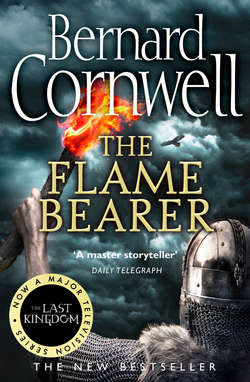Читать книгу The Flame Bearer - Bernard Cornwell - Страница 13
Four
ОглавлениеThe stone where Father Herefrith had insisted we meet was a rough pillar, twice the height of a man, standing gaunt above a gentle and fertile valley an hour’s easy ride from the fort. It was one of the strange stones that the old people had placed all across Britain. Some stones stood in rings, some made passages, some looked like tables made for giants, and many, like the one on the valley’s southern crest, were lonely markers. We had ridden north from the fort, following a cattle path, and when I reached the stone I touched the hammer hanging at my neck and wondered what god had wanted the stone put beside the path, and why. Finan made the sign of the cross. Egil, who had grown up in the River Beina’s valley, said that his father had always called the pillar Thor’s Stone, ‘but the Saxons call it Satan’s Stone, lord.’
‘I prefer Thor’s Stone,’ I said.
‘There were Saxons living here?’ my son asked.
‘When my father arrived, yes, lord.’
‘What happened to them?’
‘Some died, some fled, and some stayed as slaves.’
The Saxons had now had their revenge because, just north of the crest on which the stone stood and beside a ford of the Beina, was a burned-out steading. The fire had been recent, and Egil confirmed that it had been one of the few places that Brunulf’s men had destroyed. ‘They forced everyone to leave,’ he said.
‘None was killed?’
He shook his head. ‘The folk were told they had to go before sundown, but that was all. They even said the man who led the Saxons was apologetic.’
‘Strange way to start a war,’ my son remarked, ‘being apologetic.’
‘They want us to draw the first blood,’ I said.
My son kicked a half-burned beam. ‘Then why burn this place?’
‘To persuade us to attack them? To provoke revenge?’ I could think of no better explanation, but why then had Brunulf been so meek when he met me?
Brunulf’s men had burned the hall, barn, and cattle byres. Judging by the size of the blackened remnants the steading had been prosperous, and the folk who lived there must have thought it a safe place because they had built no palisade. The ruins lay just yards from the river, where the ford had been trampled by the hooves of countless cattle, while upstream of the steading an elaborate fish trap had been made clear across the river. The trap had silted up, becoming a crude dam, which, in turn, had flooded the pastures to form a shallow lake. A few cottages remained unharmed, enough to offer us crowded shelter, while lengths of charred timber made good fires on which we roasted mutton ribs. I posted sentries in the woodland to our south, and more in a stand of willows on the ford’s further bank.
My son was apprehensive. More than once he left the fire and walked to the steading’s southern edge to stare at the gaunt stone on the skyline. He was imagining men there, shapes in the darkness, the glint of fire reflected from sword-blades. ‘Don’t fret,’ I told him after moonrise, ‘they won’t be coming.’
